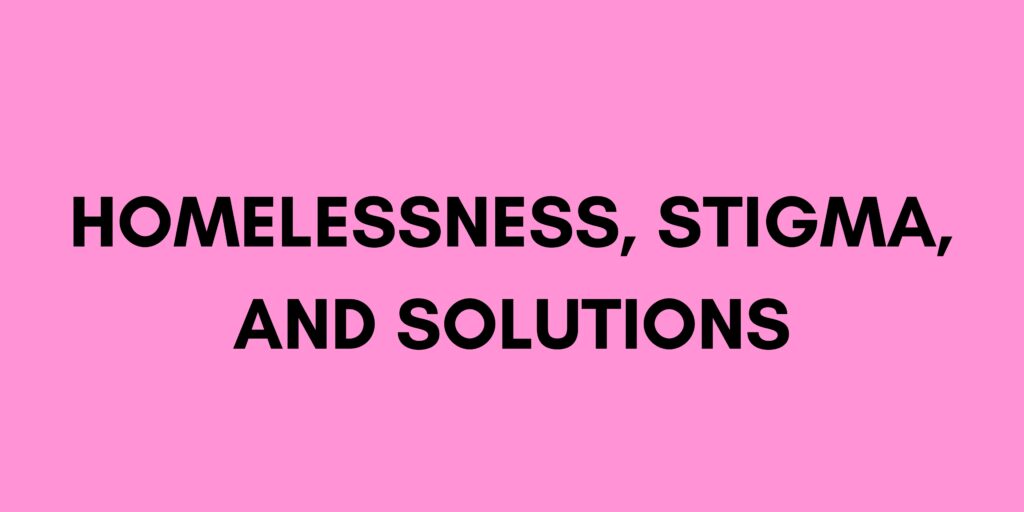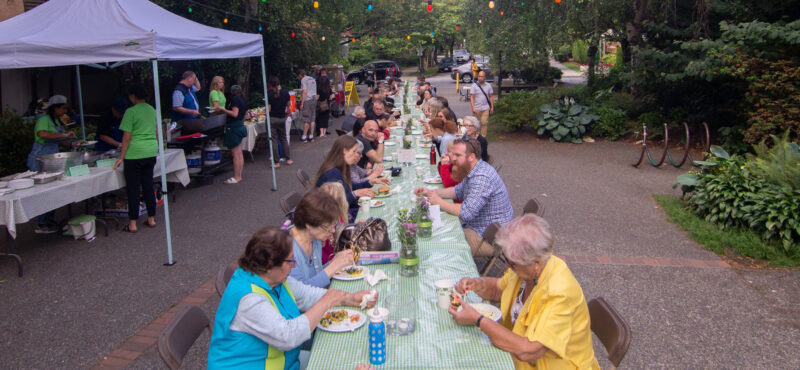Phone: 604-683-2554 | Email: welcome@gordonhouse.org
Homelessness, Stigma, and Solutions

Earlier this year we conducted a community survey to find out what neighbours were interested in learning more about when it comes to issues regarding housing and homelessness. 14% of respondents highlighted a lack of understanding around housing opportunities for people experiencing homelessness. Concerns on the pervasiveness of homelessness and a lack of understanding of substance use and mental health issues was voiced by 13% respondents. (Read our substance use blog post HERE) Most respondents were interested in why the issue of homelessness has not yet been solved, especially considering years of investment and agency collaboration on this issue. One respondent asked –
“Why as a democratic community do we continue to accept our fellow citizens to live in conditions that we would not choose to live in?”
Stigma
Stigma can be defined as disapproval of certain behaviours or groups of people. This usually manifests as stereotyping and blaming individuals for systemic failures.
Stigmatizing unhoused folks is not a new phenomenon. The “Elizabethean Poor Laws” categorized those in poverty into ‘deserving poor’ and ‘undeserving poor’. The idea behind these laws was to penalize those who were deemed to be responsible for their own poverty through prison, fines, and public shaming. Today’s society still tends towards some of these measures due to a long engrained social stigma. For unhoused people this social stigma results in increased isolation and vulnerability and creates barriers to exiting homelessness.
The engrained stigma and misconceptions that surround poverty and homelessness actively prevent us from implementing successful solutions. Pivot Legal Society conducted research into the prevalence of stigma towards unhoused people in BC and found that stigma was present across our communities and our institutions (eg. healthcare, policing, government). The effects of this engrained social stigma trapped unhoused people in a cycle of harm. Read more HERE to get a sense of how this stigma manifests in everyday life and contributes to the suffering of our unhoused neighbours. The full report is at the top of the page, and you can scroll down for bite size videos.
This excellent selection of videos from Rain City Housing identifies a number of common homelessness myths, and replaces them with factual information. It features Dr. Bonnie Henry speaking about the myths regarding homelessness and addiction.
Occasionally you may hear people using the word ‘homeless’ as a catch-all term for poverty, substance use, and poor mental health. A growing body of research shows that homelessness is not a homogenous experience. The reality is that while some life experiences may cause some people to become more vulnerable to housing insecurity, not all people who experience homelessness are facing the same issues.
Unhoused people have only one definite thing in common with one another – they don’t have access to safe, suitable, stable, affordable housing.
Success stories in tackling homelessness
Housing First is an approach to ending homelessness that prioritizes placing the person who is unhoused straight into a safe home where they live independently in the community. Once housed the person has the option to engage with a multidisciplinary team to create a support plan that suits their specific needs. Traditional models require unhoused people to live in temporary accommodation and stop using substances or receive psychiatric treatment before being eligible for housing support services, but Housing First professionals will work with the person in their own home to address their needs without unnecessary eligibility criteria . The Housing First model hinges on the concept of housing as a basic human right where there are no prerequisites to being housed.
At Home – Chez Soi was a national study by the Mental Health Commission of Canada that studied the effectiveness of Housing First in various Canadian cities, focusing on different populations in each city between 2009 to 2013. The study was considered to be a huge success. You can look at the report on the Vancouver study here which focused on those who were experiencing homelessness while also using substances. It includes an economic analysis that proves the cost effectiveness of the Housing First approach. National Housing Strategy takes this success into account and Housing First falls under the Reaching Home – Canada’s Homelessness Strategy.
Finland is currently working towards a national goal to end homelessness across the country by 2027. Finland are achieving this through their commitment to the view of housing as a basic human right, and a resolution towards consistent provision of affordable housing. 25 per cent of all housing in Finland is affordable housing, across all areas and neighbourhoods. Finland are on track to attain their goal through a commitment to strong housing policies and the implementation of a Housing First approach. Check out this CBC news article to learn more. Another Nordic country that has had success in tackling homelessness is Norway. Again, this has been achieved through continued commitment to national strategies that shift focus from temporary homelessness accommodation to long term independent housing. Read more here.
Housing First is a highly regarded evidence based approach that is used around the world, and when fully implemented the approach achieves a high success rate. This approach shows us that the best way to tackle homelessness is to look at it as a systemic housing problem. The main stumbling block faced by professionals when implementing Housing First is a lack of affordable housing across all neighbourhoods to place people in. Read more about affordable housing in Vancouver HERE.
13% of survey respondents were interested in the role and involvement of government in addressing homelessness and substance use. Earlier this year we asked Federal Election candidates to respond to a series of questions that raised issues important to our community. This included tackling homelessness and housing affordability, and can be read HERE.



